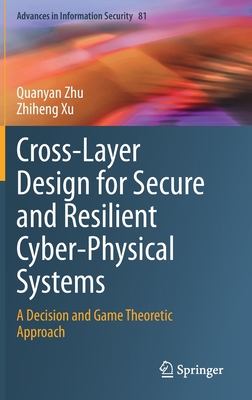Cross-Layer Design for Secure and Resilient Cyber-Physical Systems: A Decision and Game Theoretic Approach
暫譯: 跨層設計以實現安全與韌性的網絡物理系統:決策與博弈理論方法
Zhu, Quanyan, Xu, Zhiheng
- 出版商: Springer
- 出版日期: 2020-11-17
- 售價: $7,940
- 貴賓價: 9.8 折 $7,781
- 語言: 英文
- 頁數: 212
- 裝訂: Hardcover - also called cloth, retail trade, or trade
- ISBN: 3030602508
- ISBN-13: 9783030602505
-
相關分類:
Penetration-test
海外代購書籍(需單獨結帳)
商品描述
This book introduces a cross-layer design to achieve security and resilience for CPSs (Cyber-Physical Systems). The authors interconnect various technical tools and methods to capture the different properties between cyber and physical layers. Part II of this book bridges the gap between cryptography and control-theoretic tools. It develops a bespoke crypto-control framework to address security and resiliency in control and estimation problems where the outsourcing of computations is possible. Part III of this book bridges the gap between game theory and control theory and develops interdependent impact-aware security defense strategies and cyber-aware resilient control strategies.
With the rapid development of smart cities, there is a growing need to integrate the physical systems, ranging from large-scale infrastructures to small embedded systems, with networked communications. The integration of the physical and cyber systems forms Cyber-Physical Systems (CPSs), enabling the use of digital information and control technologies to improve the monitoring, operation, and planning of the systems. Despite these advantages, they are vulnerable to cyber-physical attacks, which aim to damage the physical layer through the cyber network.
This book also uses case studies from autonomous systems, communication-based train control systems, cyber manufacturing, and robotic systems to illustrate the proposed methodologies. These case studies aim to motivate readers to adopt a cross-layer system perspective toward security and resilience issues of large and complex systems and develop domain-specific solutions to address CPS challenges.
商品描述(中文翻譯)
本書介紹了一種跨層設計,以實現網路物理系統(CPSs, Cyber-Physical Systems)的安全性和韌性。作者將各種技術工具和方法互相連結,以捕捉網路層和物理層之間的不同特性。本書的第二部分彌補了密碼學與控制理論工具之間的差距。它開發了一個量身定制的加密控制框架,以解決在計算外包可能的情況下,控制和估計問題中的安全性和韌性。本書的第三部分則彌補了博弈論與控制理論之間的差距,並開發了相互依賴的影響感知安全防禦策略和網路感知的韌性控制策略。
隨著智慧城市的快速發展,將從大型基礎設施到小型嵌入式系統的物理系統與網路通信整合的需求日益增加。物理系統與網路系統的整合形成了網路物理系統(CPSs),使得利用數位信息和控制技術來改善系統的監控、操作和規劃成為可能。儘管這些優勢存在,但它們仍然容易受到網路物理攻擊的威脅,這些攻擊旨在通過網路來損害物理層。
本書還使用了來自自主系統、基於通信的列車控制系統、網路製造和機器人系統的案例研究,以說明所提出的方法論。這些案例研究旨在激勵讀者採用跨層系統的視角來看待大型和複雜系統的安全性和韌性問題,並開發特定領域的解決方案以應對CPS挑戰。
本書描述了一套全面的解決方案,以應對安全和韌性控制系統中的各種技術挑戰(本書中的許多發現對於任何從事網路安全工作的人都非常有用)。從事計算機科學和工程的研究人員、教授和高級學生將會發現本書作為參考或輔助教材非常有用。對網路安全感興趣的行業專業人士和軍事工作者也會希望購買本書。
作者簡介
Zhiheng Xu received his Ph.D. degree in Electrical Engineering from New York University in 2018. After his Ph.D. graduation, he went to Nanyang Technological University, Singapore, working as Research Fellow for two years. Currently, he works as a senior robotics software engineer at the Department of Intelligent Machines, Dyson Company. His research interests include cyber-physical security, artificial intelligence, reinforcement learning, intelligent decision making, and game theory
作者簡介(中文翻譯)
**全燕 朱**於2006年獲得麥吉爾大學(McGill University)榮譽電機工程學士學位,2008年獲得多倫多大學(University of Toronto)碩士學位,並於2013年獲得伊利諾伊大學香檳分校(University of Illinois at Urbana-Champaign, UIUC)博士學位。在普林斯頓大學(Princeton University)任職後,他目前是紐約大學(New York University, NYU)電機與計算機工程系的副教授。他是NYU城市科學與進步中心(Center for Urban Science and Progress, CUSP)的附屬教員。他獲得多項獎項,包括NSF CAREER獎、NYU Goddard年輕教員獎、NSERC博士後獎學金(PDF)、NSERC加拿大研究生獎學金(CGS)以及Mavis未來教員獎學金。他主導並主持了INFOCOM智慧能源系統通訊與控制研討會(CCSES)、中西部控制與博弈理論研討會(WCGT)以及ICRA機器人安全與隱私研討會。他目前的研究興趣包括博弈理論、機器學習、網路欺騙、網路優化與控制、智慧城市、物聯網以及網路物理系統。他曾擔任2016年和2020年第七屆及第十一屆安全決策與博弈理論會議(GameSec)的總主席或技術程序委員會主席,2018年第九屆國際網路遊戲、控制與優化會議(NETGCOOP),2019年第五屆國際人工智慧與安全會議(ICAIS 2019),以及2020年IEEE資訊取證與安全研討會(WIFS)。他還於2020年主導了IEEE控制系統學會(CSS)安全、隱私與韌性技術委員會。他是最近由Springer出版的兩本書的共同作者:關鍵基礎設施的網路安全:博弈理論方法(與S. Rass、S. Schauer及S. König合著)以及韌性相互依賴網路分析與設計的博弈與決策理論方法(與J. Chen合著)。
**志恆 許**於2018年獲得紐約大學(New York University)電機工程博士學位。博士畢業後,他前往新加坡南洋理工大學(Nanyang Technological University)擔任研究員兩年。目前,他在戴森公司(Dyson Company)智能機器部門擔任高級機器人軟體工程師。他的研究興趣包括網路物理安全、人工智慧、強化學習、智能決策以及博弈理論。










